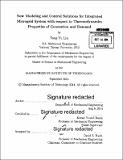| dc.contributor.advisor | Kamal Youcef-Toumi. | en_US |
| dc.contributor.author | Liu, Fang-Yu, S.M. Massachusetts Institute of Technology | en_US |
| dc.contributor.other | Massachusetts Institute of Technology. Department of Mechanical Engineering. | en_US |
| dc.date.accessioned | 2015-02-05T18:25:47Z | |
| dc.date.available | 2015-02-05T18:25:47Z | |
| dc.date.copyright | 2014 | en_US |
| dc.date.issued | 2014 | en_US |
| dc.identifier.uri | http://hdl.handle.net/1721.1/93825 | |
| dc.description | Thesis: S.M., Massachusetts Institute of Technology, Department of Mechanical Engineering, 2014. | en_US |
| dc.description | Cataloged from PDF version of thesis. | en_US |
| dc.description | Includes bibliographical references (pages 117-119). | en_US |
| dc.description.abstract | This thesis investigates microgrid control stability with respect to thermodynamics behaviors of generation and demand. First, a new integrated microgrid model is introduced. This model consists of a combined cycle power plant, a building with air-conditioning system and a renewable source. This integrated model allows researchers to study microgrid stability while considering the physical behaviors of the generation and demand. Specifically, the model takes into account the slow dynamics existing in both the generation side and demand side. Second, a model predictive controller (MPC) is implemented for this new integrated system. The MPC uses a linearized model of this system to generate control commands by predicting the system behavior and optimize the system performance. The MPC minimizes an objective function that includes the power imbalance between generation and load, as well as the temperature differences between zone temperatures and the desired temperature setpoints. Overall, the results in this work proved that excellent grid balance could be achieved by a model predictive controller for our integrated model. The modeling and control performance have been verified by simulating several different scenarios. | en_US |
| dc.description.statementofresponsibility | by Fang-Yu Liu. | en_US |
| dc.format.extent | 119 pages | en_US |
| dc.language.iso | eng | en_US |
| dc.publisher | Massachusetts Institute of Technology | en_US |
| dc.rights | M.I.T. theses are protected by copyright. They may be viewed from this source for any purpose, but reproduction or distribution in any format is prohibited without written permission. See provided URL for inquiries about permission. | en_US |
| dc.rights.uri | http://dspace.mit.edu/handle/1721.1/7582 | en_US |
| dc.subject | Mechanical Engineering. | en_US |
| dc.title | New modeling and control solutions for integrated microgrid system with respect to thermodynamics properties of generation and demand | en_US |
| dc.type | Thesis | en_US |
| dc.description.degree | S.M. | en_US |
| dc.contributor.department | Massachusetts Institute of Technology. Department of Mechanical Engineering | |
| dc.identifier.oclc | 900642355 | en_US |
